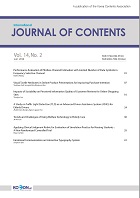- 권한신청
- P-ISSN1738-6764
- E-ISSN2093-7504
- KCI
 ISSN : 1738-6764
ISSN : 1738-6764
Safety and Effectiveness of Food Allergen Immunotherapy (Oral):A Systematic Literature Review and Meta-analysis
Yea-Il Joo (National Evidence-based Healthcare Collaborating Agency)
Abstract
Purpose: Food Allergen Immunotherapy (Oral) is a form of immunotherapy administered to patients who are allergic to foods such as egg, milk, and peanut. The food allergen is orally administered to the patient in an escalating dose for desensitization or tolerance development. The safety and effectiveness of the therapy were assessed using a systematic literature review and meta-analysis. Methods: For a literature search, 8 national databases and a number of international databases including Ovid-MEDLINE, Ovid-EMBASE, and Cochrane Library were used; and 13 articles (all from international databases) were selected. The target of Food Allergen Immunotherapy (Oral) included patients with food allergy, and the intervention was food allergen immunotherapy without limiting the food type. The safety and effectiveness of Food Allergen Immunotherapy (Oral) were assessed by reviewing all the articles reporting on the therapy. The control group received standard therapies including aversion therapy, no treatment, anti-histamine treatment, and placebo. Safety was assessed through the incidence of complication and emergency medication. Effectiveness was assessed based on therapy success rate, symptomatic improvement, and quality of life. Results: Although Food Allergen Immunotherapy (Oral) was shown to have successful desensitization in patients with food allergy, the safety of the technique has not yet reached an acceptable level; the possible reason is due to the high rate of complication and frequency of emergency medication. Also, each study employed varying protocols while relying on a small number of participants and a short monitoring period. Conclusion: The results of assessment suggest that the level of evidence from current literature review is low and further research is necessitated for the verification of the safety and effectiveness of the therapy (Grade of Recommendation: A; Level of Technology: II-b).
- keywords
- Allergen Immunotherapy, Review, Systematic, Meta-analysis, Food Hypersensitivity.
- 다운로드 수
- 조회수
- 0KCI 피인용수
- 0WOS 피인용수

